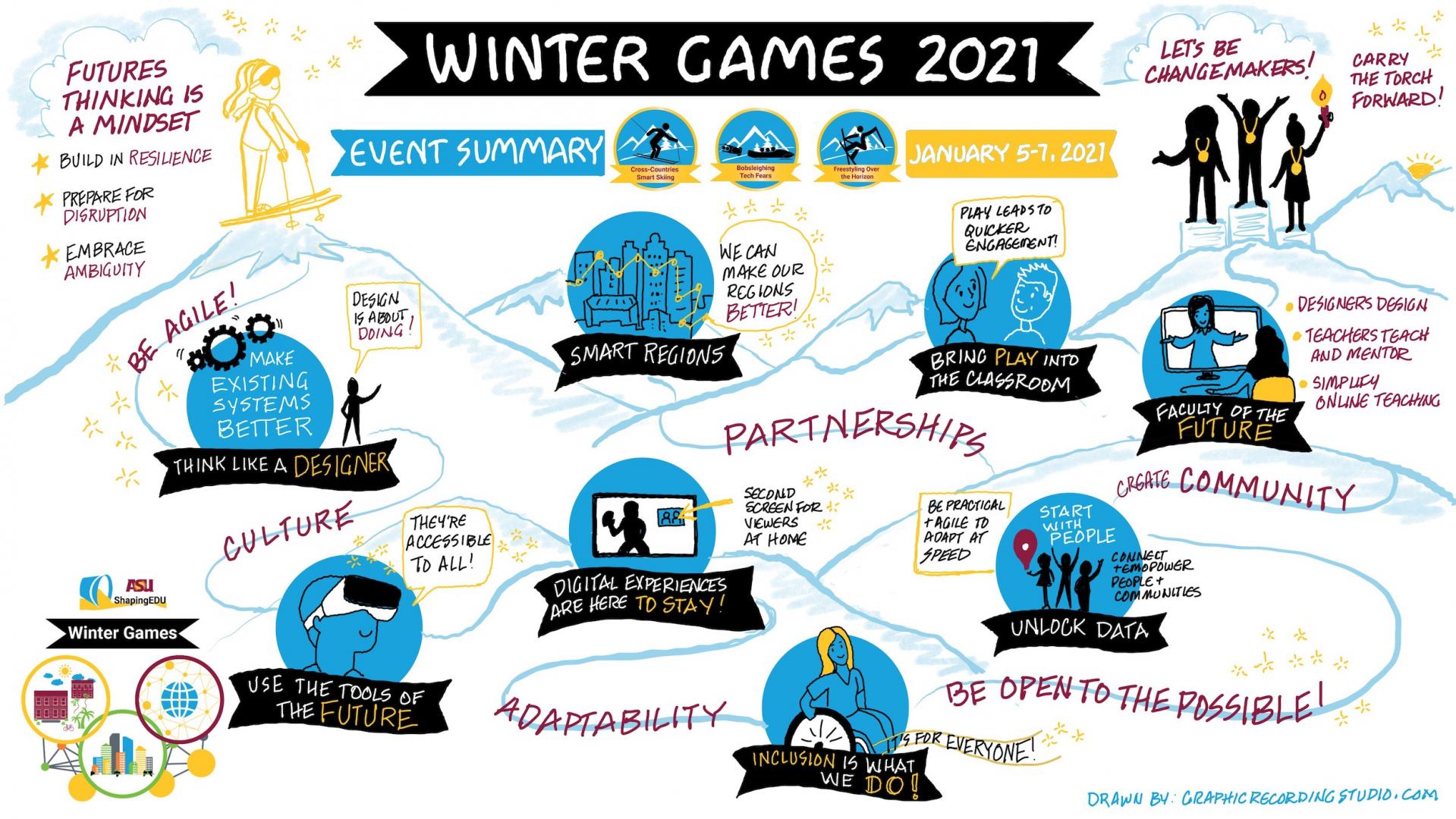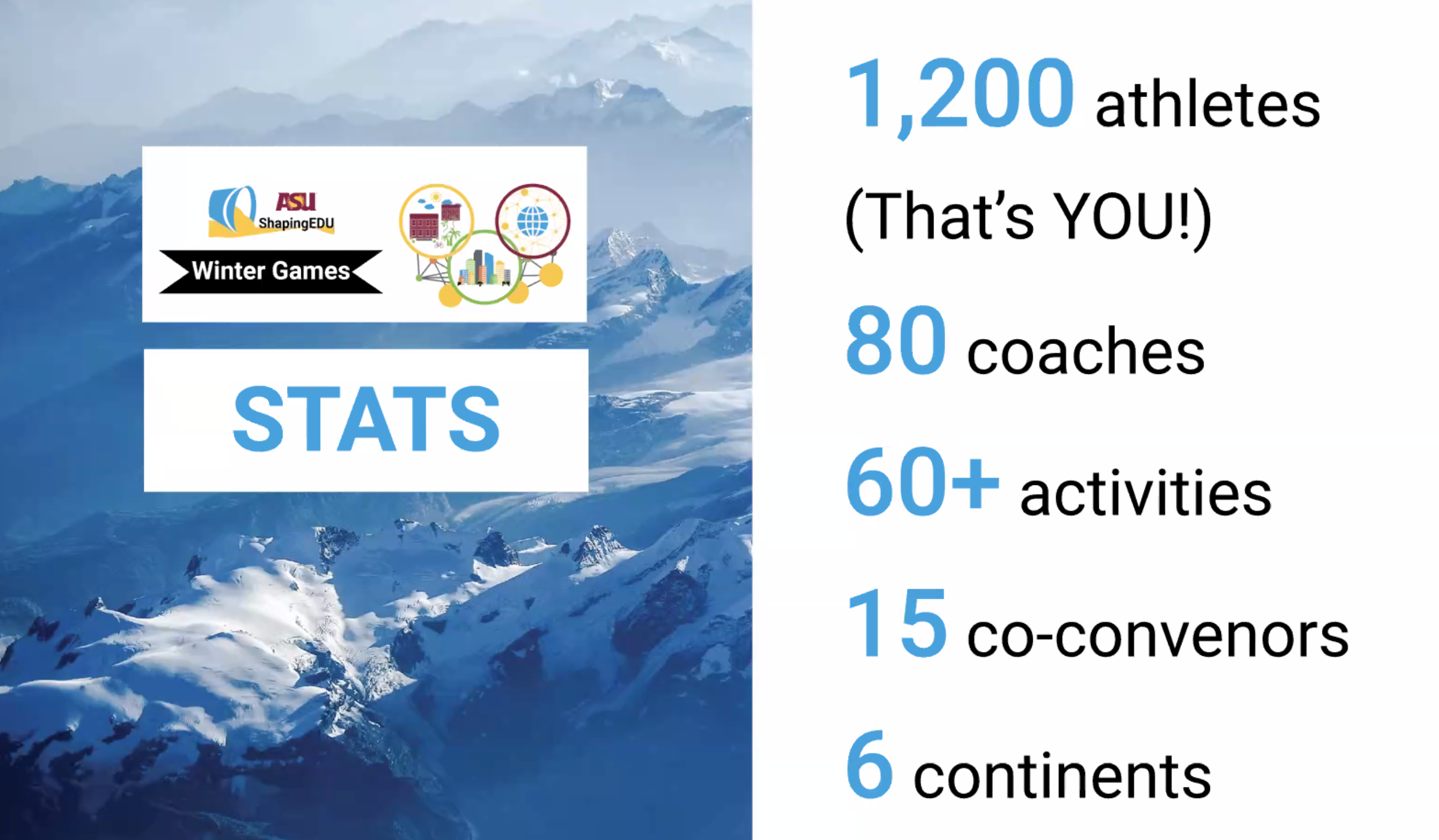Education and smart region changemakers win gold at the first-ever ShapingEDU Winter Games

What do education and smart region design have in common? A goal of creating smarter campuses, cities and regions, so that we can ultimately create a smarter world for generations to come.
This was the driving motivation behind ShapingEDU Winter Games, which brought together more than 1,200 changemakers — education leaders, smart city experts, students, faculty and technologists — from January 5-7, 2021 to drive forward the conversations, plans and actionable ways for individuals and communities to shape the future of living and learning.
"It's really all about how we come together as a community to address ongoing challenges and barriers and see past it, to use our heartfelt principles of inclusion and access and equity and design that better world together,” said Samantha Becker, Winter Games Olympic Trainer and Executive Director, Creative and Communications for ASU’s University Technology Office.
The spark that lit the torch
While the pandemic has paused in-person events, it has not stopped dreamers, doers and drivers from meeting virtually. The powerhouse team behind ShapingEDU’s popular Learning(Hu)Man, a week-long, camp-themed event, joined forces with The Connective — a group of 23 city, town and county local government organizations who work collaboratively to develop and deploy technology scalable solutions rooted in connectivity, mobility, equity and sustainability — to further connect education and smart region design.

“Our motto from the very beginning has been that ‘Collaboration is our Next Competitive Advantage,’” said Dominic Papa, Arizona Commerce Authority’s Vice President for the Smart State Initiative and a leader in The Connective community. “Therefore, we were tremendously excited for the opportunity to collaborate with ASU’s University Technology Office to produce this ever-important global event for the smart cities community. We are both dedicated to making the world a better place and getting the message out about the work that needs to be done.”
Unsurprisingly then, much of the discussion centered around how to make life better, now and in the future. “When I talk about smart cities and smart regions, I actually never talk about the technology,” said Professor Di Bowman, Associate Dean, ASU Law and Co-Director for ASU’s Center for Smart Cities and Regions. “It’s about improving their quality of life, however defined. Humanity is central to the work that we’re doing.”
Olympic highlights: A view from the chairlift
Over the course of three days, participants were invited to upskill and challenge themselves with some of the top educators, technologists, city planners and more at the Winter Games. Let’s look at some of the highlights from our all athelete events, shall we?
January 5: The torch is lit
Olympic Keynote - Learning Futures: Designing the Horizon
At the opening keynote, educators from ASU’s Mary Lou Fulton Teachers College encouraged athletes to visualize how we might rethink our teaching and learning environments by harnessing the opportunities of our collective uncertainty. “We are not predicting the future,” said Dr. Sean Leahy, Director of Technology Initiatives at ASU. “We are designing in a principled manner to build resilient educational systems to address uncertainty.” Watch the keynote for more information.
Fireside Chat - State of the Smart Region Update & Gala
At the State of the Smart Region, Papa, Bowman and Jason Whittet of Amazon Web Services celebrated the one-year anniversary of The Connective. They also spoke about how the greater Phoenix area is an “innovation sandbox,” a 21st century technology proving ground where they can test, prove, scale and export ideas to other regions around the world, through partnerships with Nairobi, Amsterdam, Sydney and others. “We’re not keeping our best-kept secrets alone here,” Papa said.
At the State of the Smart Region Gala, Dean Doug Sylvester of ASU’s Sandra Day O’Connor School of Law moderated the panel composed of elected officials, Chief Information Officers, university leaders and technology industry champions. On the smart campus level, John Wolfe from Cox Communications, discussed the progress made on the Cox Connected Environments Collaboratory, a joint effort between Cox Business and ASU. Wolfe described the partnership as “a place in which students, faculty, administration and Cox come together to prioritize high-impact problems and develop smart campus solutions.” Cox Business was a Diamond co-convener of the Winter Games.
January 6: Going for the gold
Olympic Keynote - The Future of Sports and Entertainment
During Wednesday’s Olympic Keynote, our all-star panel of experts in technology and sports entertainment discussed some of the challenges that sports teams are currently facing while looking forward to the future of sports during and after the pandemic.
Dean Stoyer, Chief marketing & Communications Officer for the Phoenix Suns, shared how the Suns pivoted to keep fans engaged in the basketball season by playing remaining games in the NBA season in the NBA 2K video game on Twitch, which resulted in 3 million unique viewers via Twitch and Twitter. Moving forward, “health and safety in confidence is key,” Stoyer said, sharing that when fans return to the stadium, they’ll see innovations like UV sanitization on the escalators to in-seat ordering to eliminate cuing, cashless transactions and ticketless environments. Check out the full panel discussion.
Fireside Chat - Heart of Inclusion
With the news from the riots at the U.S. Capitol front of mind for many, the ShapingEDU community united for a discussion on diversity and inclusion from motivational speaker Alycia Anderson. Before Anderson spoke, Becker said: “It's our intent to shape a better world for working and living. It’s really all about how we come together as a community to address ongoing challenges and barriers and see past it, to use our heartfelt principles of inclusion and access and equity and design that better world together.”
In her Fireside Chat, Anderson spoke about her mission to motivate change through the power of diversity and inclusion, explaining that diversity is who we are, and inclusion is what we do.
Anderson left athletes with a call for action: “I challenge you when leaving today to be open to the collective work that it takes to remove these invisibility screens and to see people for people and me for me. Adaptability, communication, and believing it’s possible is core to all of this.” Watch her inspiring talk
Après-Ski - Winter Games Musical Artists Challenge
Athletes enjoyed the sweet sounds of music from around the globe during the interactive Musical Artists Challenge, which was designed to provide opportunities for musicians and Winter Games attendees to engage with each other through video, audio performance and live chat. The event was hosted by Zoom, a platinum co-convener of the event.
“Music provides a singular experience for all who listen,” said Warick Pond, ASU Executive Director of Strategic Implementation Office and emcee for the evening. “Songwriters and musicians inspire us, take us out of our current space, feelings and thoughts into somewhere new.” Our seven artists did just that. Enjoy the Musical Artists Challenge
Fun fact: Pond was also the singer and co-songwriter for our Winter Games Theme Song!
January 7: Stick the landing
Olympic Keynote - Unlocking the Data to Drive a Smart Region Vision
Athletes boarded the luge with an esteemed panel of elected officials, policy makers and members of the research community for a ride through the world of making complex decisions and proposing novel solutions to challenges using data. “Data is critically important in terms of being able to back up your decisions,” said Corey Woods, Mayor of Tempe, Arizona. Woods shared some of his goals for Tempe this year, including an affordable housing initiative, which came about from analyzing data and seeing that change is necessary to keep up with Tempe’s need for attainable and affordable housing.
They also spoke about building out a smart and sustainable region, data utilization challenges, and taking advantage of the intersection of sustainable developments goals, international standards, and smart regions.
Fireside Chat - Reflections from the Top
Wednesday’s culminating Fireside Chat, led by Allison Hall and Kyle Bowen from the University Technology Office’s Learning Experience, helped athletes reflect and share their learning experiences through the art of storytelling. Participants broke out into themed rooms — including the future of work, new realities and more — working together to create products of the future that were inspired by their key takeaways and new knowledge gained over the three days.
From exploring ways to improve mapping skills learned in the classroom to future career to advocating for accessible immersive experiences and more. “I’ve been so inspired by all of the stories today, all the experiences throughout the week,” said Hall. “I look forward to seeing all the things those torches light on fire as you leave here.”
Carrying Forward the Torch + Medal Ceremony
Athletes and coaches gathered one last time to recognize those who sparked new ideas and fanned the flames of change during the Games.
As attendees clearly knew, their work is far from over. Becker described the global impact of the Winter Games as "vital and timely conversations” for the year ahead. “I am thankful to the education leaders, faculty, students, technologists and policymakers who took the time to share constructive perspectives for our learning and smart community futures,” Becker said. “As a result, I think we're going to see more transformative work being done at the intersection of our campuses and cities. Everyone can make a difference individually, but new relationships formed means we'll surely go farther together."
Papa echoed Becker’s sentiments: “The Winter Games provided attendees with an opportunity to learn more about the smart region work we are leading in the Greater Phoenix Region and beyond. After participating in Winter Games, I hope that the athletes are empowered by what they learned, and, as citizens, build the partnerships and collaborations necessary to take action and make the positive changes in their communities and the world.”
As part of carrying the torch forward to make a difference in their local community, the ShapingEDU Winter Games donated $5,000 to Human Services Campus (HSC) and St. Vincent DePaul by serving lunch to more than 500 Phoenicians currently experiencing homelessness on Friday, January 8, 2021.
Souvenirs from the slopes
Athletes are encouraged to stay connected and continue the conversion long after the Olympic flame goes out:
Watch Winter Games session recordings – new videos are added daily!
Browse all the graphic facilitations from Winter Games Art Director Alece Birnbach of Graphic Recording Studio.
Browse the Athlete Scrapbook to see how the Winter Games has inspired participants to carry the torch forward.
Earn Olympic digital badges to wear proudly around the internet to showcase your achievement on the virtual slopes!
A very special thanks to all our all-star co-conveners who made Winter Games possible: